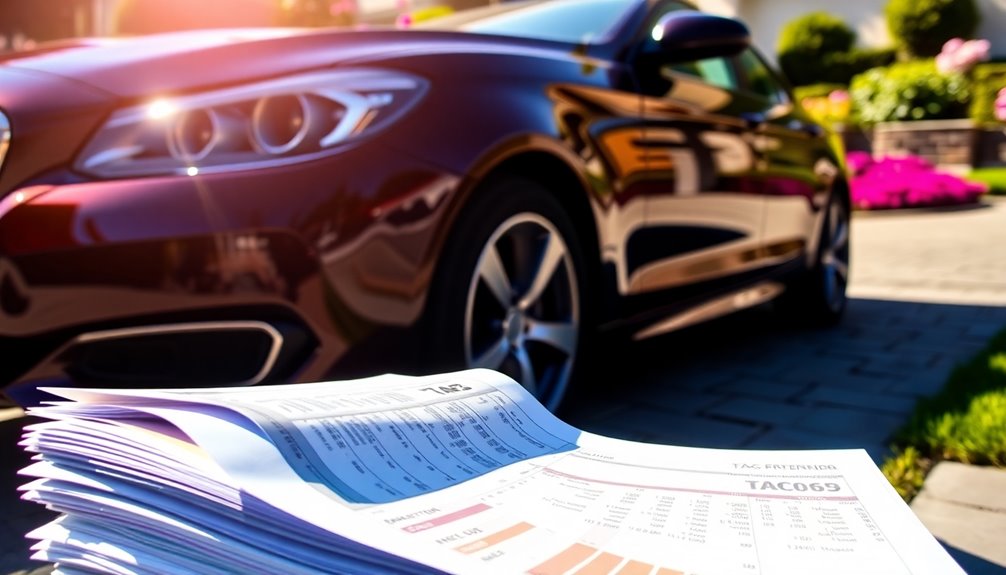When you're buying a car, taxes can vary widely based on your state. Most states charge a sales tax on the purchase price, which usually ranges from about 2% to over 8%. For example, Massachusetts has a sales tax of 6.25%, while Nevada tops out at 8.25%. In addition to sales tax, you might face annual property taxes and registration fees. Remember, local taxes can also increase the overall cost. It's crucial to check your state's specific rates and other fees that may apply; understanding these details can help you budget effectively for your vehicle. Want to know more?
Key Takeaways
- Massachusetts car sales tax is 6.25% of the purchase price or fair market value, whichever is higher.
- The national average car sales tax rate is 4.99%, with some states charging as much as 8.25%.
- Sales tax applies to both new and used vehicles at the time of purchase.
- Additional taxes like property tax, use tax, and registration fees may apply annually.
- Staying informed about local tax policies can help in budgeting for vehicle purchases.
Overview of Car Sales Tax
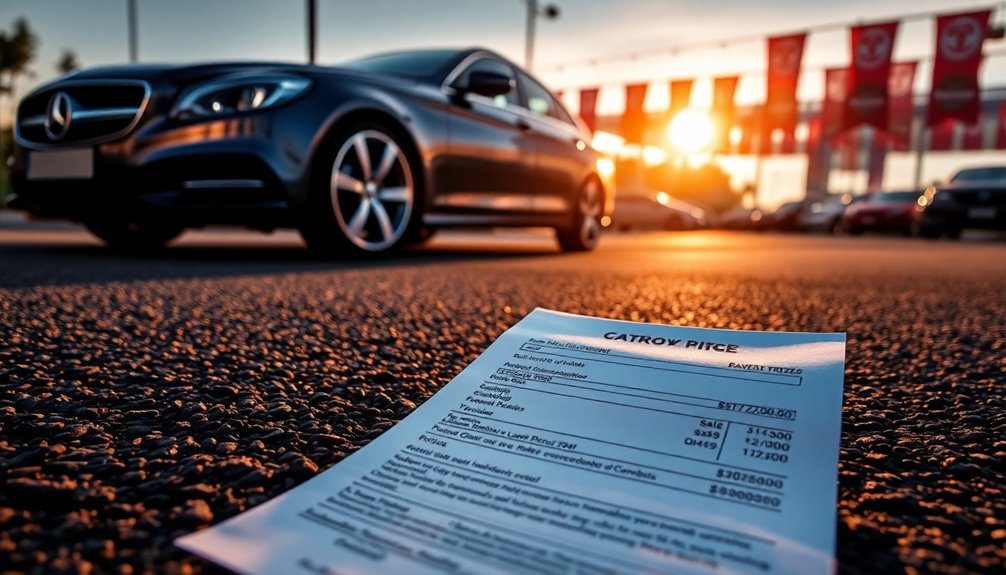
When you're buying a car in Massachusetts, it's important to understand the sales tax that comes with it. The sales tax rate on vehicles is 6.25% of the purchase price. To calculate the tax, simply multiply your car's purchase price by 0.0625. For instance, if you buy a car for $10,000, you'd owe $625 in sales tax.
This tax applies to all car purchases, whether you're buying from a dealer or a private seller. Sales tax is based on either the purchase price or the fair market value, whichever is higher. The fair market value can be determined using resources like the Kelley Blue Book. Additionally, it's essential to remember that non-residents purchasing vehicles in Massachusetts must also pay the same sales tax rate, regardless of where the vehicle will be registered.
It's crucial to note that if you buy a vehicle outside Massachusetts and bring it into the state within six months, a use tax applies.
When you finalize your purchase, you need to fill out a Motor Vehicle Certificate of Payment of Sales or Use Tax Form (ST-7R) along with an Application for Registration and Title (RMV-1).
Make sure to submit these forms within 10 days of buying the vehicle and pay the sales tax by the 20th day of the month following the purchase to avoid penalties.
Highest Car Sales Tax States
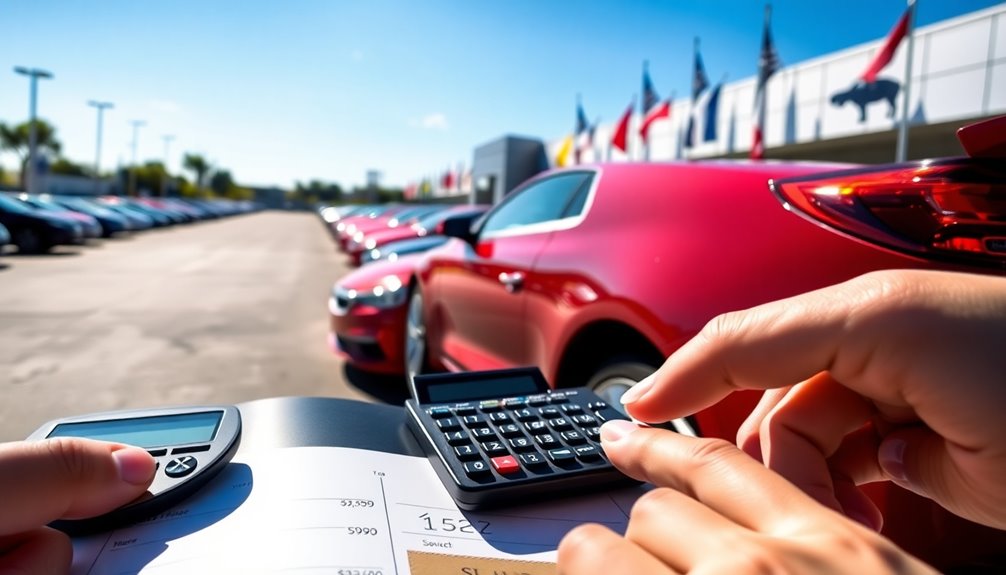
Understanding car sales tax is vital, especially if you're considering buying a vehicle in states with the highest rates. In Nevada, for instance, you'll face an 8.25% tax rate, which is the highest in the nation. Kansas follows closely at 7.5%, while both California and Illinois impose a rate of 7.25%.
Indiana, Tennessee, Rhode Island, and Georgia all come in with a 7.00% tax rate, making them significant players as well. It's important to note that the national average car sales tax rate is 4.99%, providing context for those comparing rates across different states.
Keep in mind that tax calculations can vary within states. In Nevada, for example, county-based rates can range from 4% to 8.25%. Some states, like Utah, offer trade-in credits, which can help reduce your taxable amount.
However, Virginia doesn't provide this benefit, making it essential to factor this into your budget.
Additionally, New Jersey has a tax rate of 6.63%, while Arkansas and Washington each charge 6.50%. Connecticut typically has a 6.35% rate but can be higher for specific vehicles.
Paying attention to these details can save you from unexpected costs when purchasing your next vehicle.
Moderate Car Sales Tax States
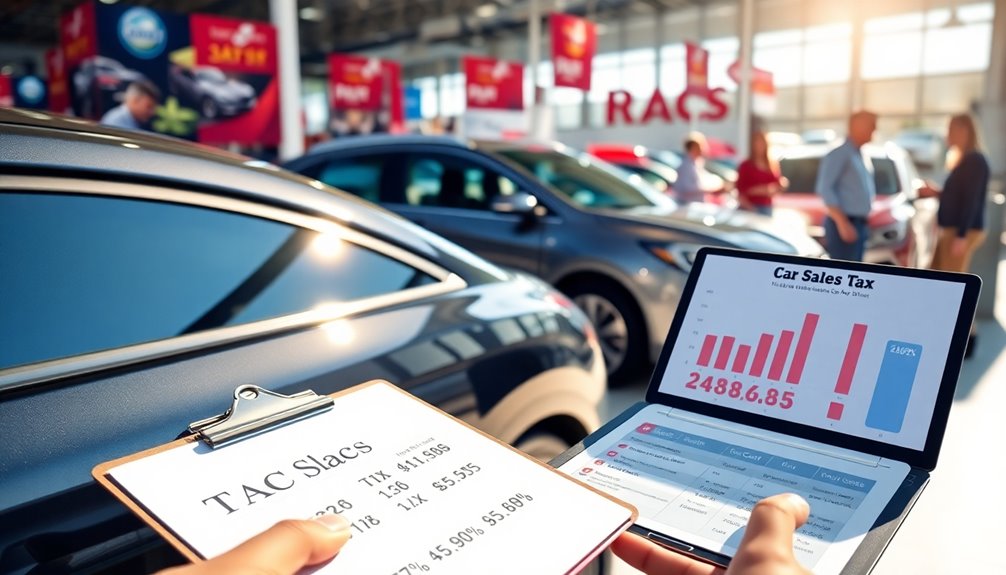
Navigating car sales tax can be a bit tricky, especially in states with moderate rates ranging from 6% to 6.9%. In these states, you'll find rates that are manageable, yet still impactful on your overall purchase price.
For instance, Florida, Idaho, Kentucky, Maryland, and Michigan all maintain a car sales tax rate of 6%. If you're looking at states with slightly higher rates, Illinois, Massachusetts, and Texas each impose a 6.3% tax, while Arkansas and Minnesota bump it up to 6.5%. States like Connecticut, Georgia, and New Jersey edge closer to the higher end of moderate, sitting at 6.4% and 6.6%. Utah and Washington may reach up to 6.9% due to local tax variations.
Keep in mind that while these rates are moderate, additional local taxes can vary significantly in certain states, such as South Carolina and Missouri, where combined rates can be much higher. Sales tax can significantly increase total vehicle cost, so it's essential to factor that into your budget. Therefore, before you finalize your purchase, make sure you calculate the total tax burden to avoid surprises. Understanding these rates can help you budget accordingly and make informed decisions when buying your next vehicle.
Lowest Car Sales Tax States
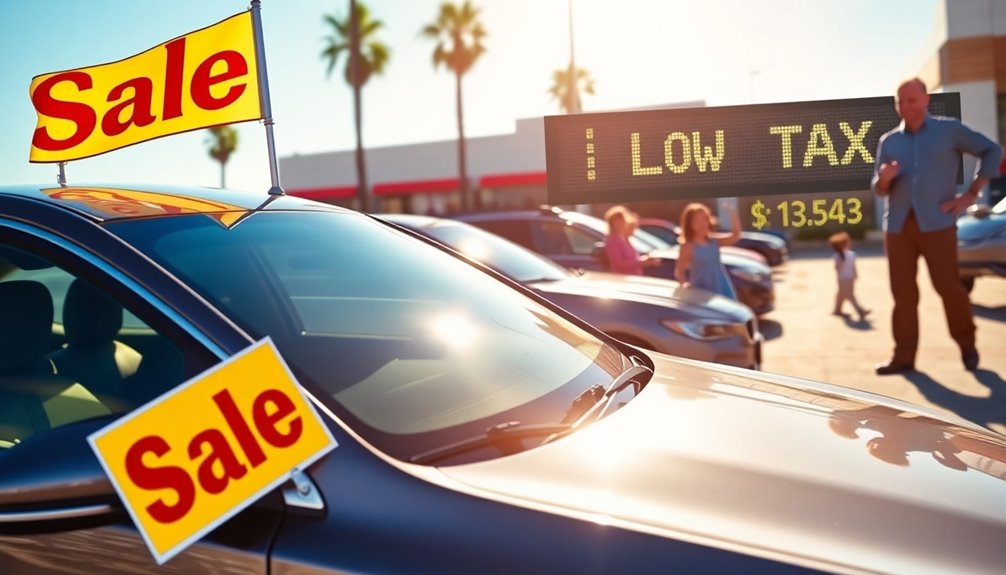
If you're looking for the best deals on car sales tax, some states stand out with significantly lower rates. For starters, you'll find states like Alaska, Delaware, Montana, New Hampshire, and Oregon, which impose no sales tax at all. That's a fantastic perk if you're purchasing a vehicle in those areas.
If you don't mind a small sales tax, Alabama at 2.00%, Colorado at 2.90%, and North Carolina with its highway-use tax at 3.00% are excellent options. Additionally, keep in mind that sales tax rate in New Jersey is 6.625%, which could significantly impact your total costs if you're considering purchasing there.
Oklahoma and South Dakota also offer competitive rates, sitting at 3.25% and 4.00%, respectively. If you're considering states with slightly higher rates, Hawaii, Louisiana, New Mexico, New York, and Wyoming each have a 4.00% tax.
Keep in mind that in these states, the sales tax applies to both new and used vehicles, and local taxes mightn't add extra costs.
Tax Calculation Methods

When it comes to calculating taxes on a car, you'll find several methods available, each tailored to different circumstances.
If you're using your vehicle for business at least 50% of the time, the MACRS method is likely your best bet. This method allows you to include the purchase price, registration costs, and taxes as part of your basis. You can then apply a 40% annual depreciation rate using IRS Form 4562. Vehicles must be used for business at least 50% of the time to qualify for MACRS.
If your business use is less than 50%, you'll need to switch to the straight-line depreciation method. This method divides the depreciable basis evenly over the vehicle's useful life, which is still considered five years.
Alternatively, you might choose the standard mileage rate method, which requires you to track your business miles. For 2024, the rate is $0.67 per mile, including depreciation, making it an easy option for some.
Lastly, the actual expense method covers all operating costs, like repairs and gas, while allowing you to choose between MACRS or straight-line depreciation.
Each method has specific record-keeping requirements, so be diligent to ensure compliance and maximize your tax benefits.
Regional Variations and Compliance
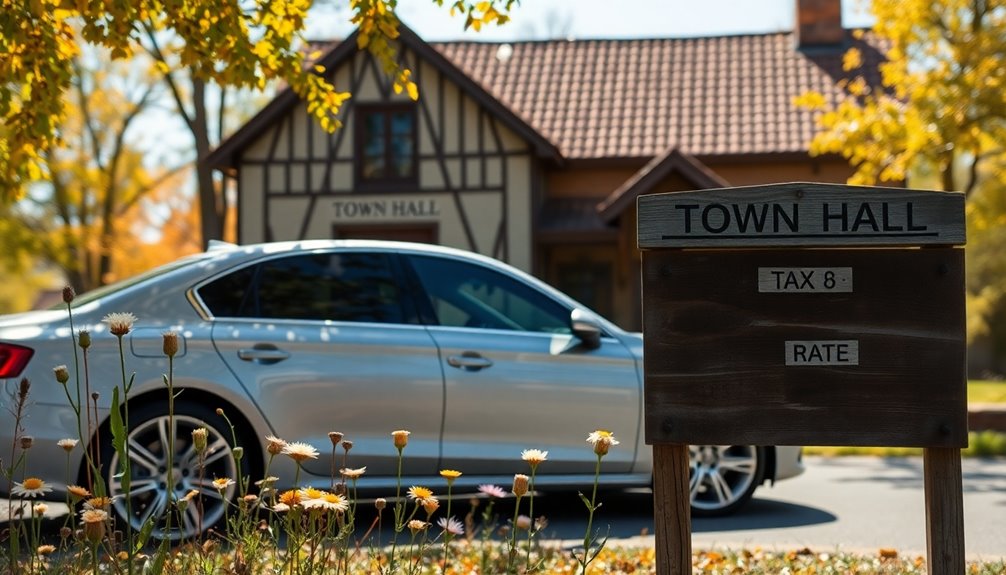
Regional variations in car taxes can significantly impact how much you owe, depending on where you live. For instance, in Argentina, tax rates range from 3.20% to 6.37%, varying by province. In Kansas, the way property tax is assessed differs based on vehicle type and weight. Factors like model year and manufacturer also play a role in determining your tax base. Additionally, changes to car tax regulations, such as those affecting commercial vehicles, can lead to increased costs for businesses.
In some regions, you can benefit from discounts, such as in Buenos Aires, where new vehicles acquired within the last five years may receive tax reductions.
Payment schedules vary too; you might pay annually, bimonthly, or quarterly.
If you're part of a FAVR program, compliance is key. You need to ensure your vehicle meets the cost and age criteria, plus drive at least 5,000 business miles yearly to avoid tax complications. Submitting an IRS vehicle declaration with your vehicle's details is necessary.
Local leaders influence tax rates, and they can change, impacting how much you pay. Always check specific policies in your area, as they can greatly affect your overall tax liability.
Frequently Asked Questions
Are There Exemptions for Electric or Hybrid Vehicles?
Yes, there are exemptions for electric and hybrid vehicles.
Many states offer rebates or tax credits to encourage their purchase, like New York's $2,000 rebate on eligible EVs. You may also find exemptions from vehicle registration fees or reduced rates.
Additionally, federal tax credits can significantly lower your overall cost.
It's best to check your state's specific incentives and eligibility requirements to maximize your savings.
How Do Trade-Ins Affect Car Sales Tax?
Trade-ins can significantly affect your car sales tax by reducing the taxable amount.
When you trade in your old vehicle, its value gets deducted from the purchase price of your new car. This means you'll pay sales tax on a lower amount, potentially saving you hundreds.
However, keep in mind that not all states allow this deduction, so it's important to check your state's rules to maximize your savings.
Can I Claim Tax Credits for Car Purchases?
Yes, you can claim tax credits for car purchases, specifically for new electric vehicles (EVs) and plug-in hybrids.
To qualify, your vehicle must meet certain criteria, including MSRP limits and battery requirements. If eligible, you can receive up to $7,500.
You can either have the dealer apply the credit during purchase or file IRS Form 8936 when you do your taxes.
Just remember, the credit applies in the tax year the vehicle's delivered.
Do I Pay Taxes on Vehicle Gifts?
Yes, you might pay taxes on vehicle gifts, depending on your state's regulations.
While the IRS allows you to gift up to $18,000 without incurring federal gift tax, state sales or use taxes may still apply.
Make sure to check your local DMV for specific requirements and possible exemptions.
You'll also need to transfer the title and may require documentation to ensure everything's in order.
Don't forget to insure the car before driving it!
Are There Additional Fees Besides Sales Tax?
Yes, there are additional fees besides sales tax when you register a vehicle.
You'll encounter registration fees based on your vehicle's horsepower, processing fees, and possibly local fees depending on your county.
If you're in certain areas, you might also need to pay for vehicle inspections and emissions testing.
Don't forget to check for any special vehicle fees if your vehicle falls into that category, like motorcycles or recreational vehicles.
Conclusion
In summary, understanding car sales tax is crucial when purchasing a vehicle. Depending on where you live, the tax can vary significantly, so it's smart to know if you're in a high, moderate, or low tax state. Remember to factor in different calculation methods and regional variations to avoid surprises. By staying informed, you can make a smarter decision and budget more effectively for your new ride. Happy car shopping!
